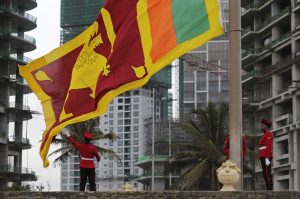On April 21, 2019 Sri Lanka was rocked by a series of bombings targeting churches and luxury hotels. The attacks, carried out by a local Islamist group with Islamic State connections, targeted Christians marking the Easter holiday and Western tourists visiting the island country. Ultimately 259 people were killed in the blasts and 500 injured. In the wake of the attack news broke that Indian intelligence had warned its Sri Lankan counterparts about the pending attack, but the warnings were not heeded and no action was taken to head off the terrorists.
A year later, Amarnath Amarasingam – an assistant professor in the School of Religion at Queen’s University in Ontario, Canada – helps us navigate what we’ve learned in the past year about Sri Lanka’s response to India’s warnings, what we know about the contours of terrorism and extremist ideology in Sri Lanka, and what impact the country’s new government (and past government dysfunction) has on its security.
Soon after the Easter Sunday bombings last year, there were various reports that Sri Lanka had received specific intelligence from India about the pending attacks. What have we learned in the year since about how the Sri Lankan government missed or failed to act on such warnings?
The day after the attack, several politicians in Sri Lanka admitted that there were precise warnings given by Indian intelligence several times in April 2019, which were ignored or failed to land on the right desk for action to be taken. The warnings, quite surprisingly, accurately named the attacker and the network that would eventually carry out the attack. In October 2019, the Sri Lankan parliamentary investigation laid blame on the former head of the intelligence service, Nilantha Jayawardena, who received information about plots in the country as early as April 4. The report from the investigation basically said that, despite several warnings, Jayawardena did not pass on the information of a potential plot to the military until April 19, two days before the attack. In early March, the Presidential Commission of Inquiry into the Easter attacks submitted its second interim report to President Gotabaya Rajapaksa, but details of the report not been made public as of this writing.
































